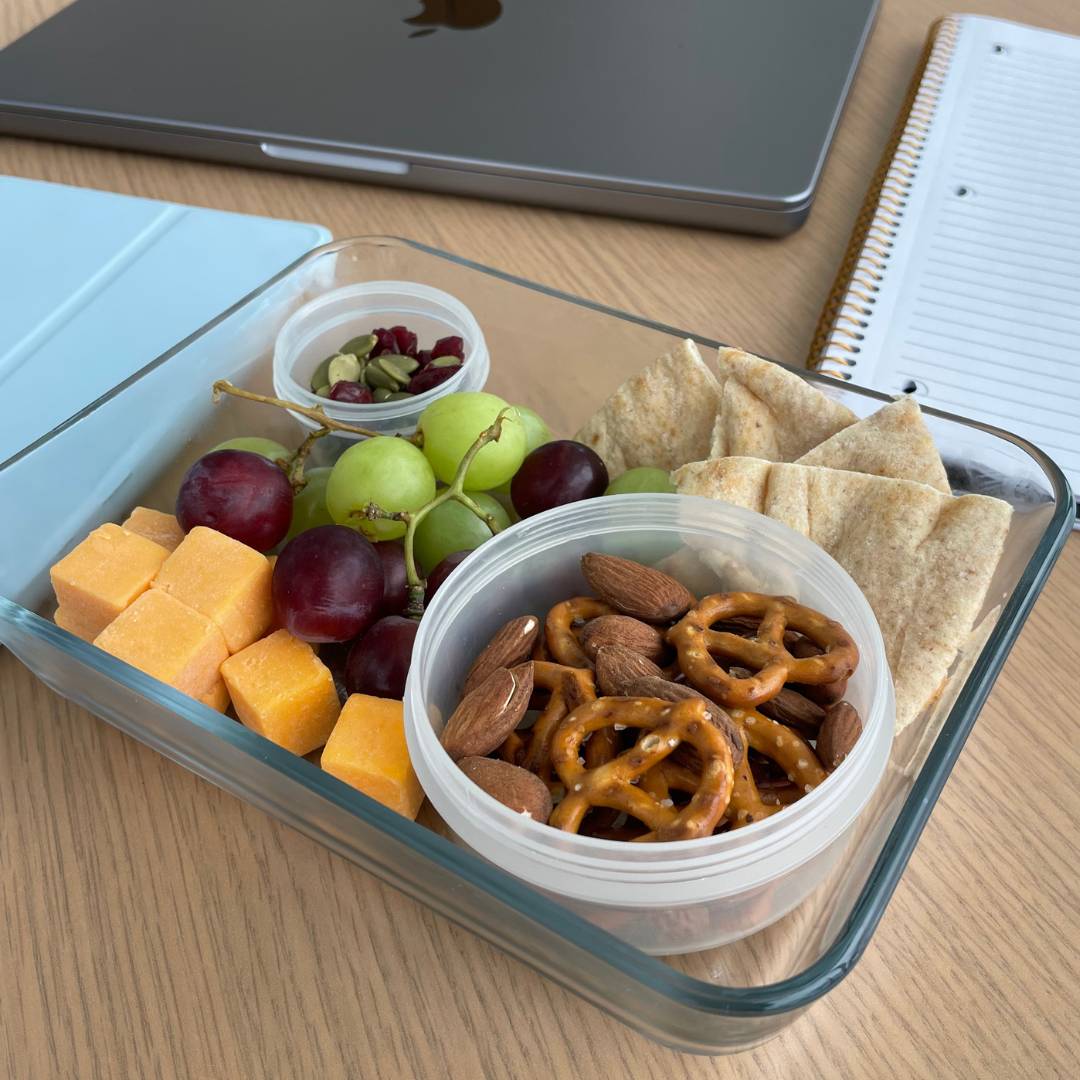Blog
Permanent link for Tips for Healthy Eating Habits for GVSU Students on October 29, 2024
Navigating college life can be a whirlwind of classes, social events, and late-night study sessions, often leading to less healthy eating habits. However, maintaining a balanced diet is crucial for both physical health and academic performance. Here are some practical tips to help college students develop healthier eating habits.
1. Plan Your Meals
Meal planning can save both time and money. Take a little time each week to plan your meals. If you have a meal plan on campus you can plan your meals by viewing the menus for the week at: https://www.gvsu.edu/campusdine/hours-index.htm. This doesn’t have to be elaborate; simple ideas like batch-cooking grains or roasting vegetables can provide a base for multiple meals. Knowing what you will eat makes you less likely to choose not as nutrient-dense foods.
2. Stock Your Pantry Wisely
Keep your kitchen stocked with healthy staples. Whole grains, canned beans, frozen vegetables, and healthy snacks like nuts and fruits can make it easy to whip up a nutritious meal. If you don't have a kitchen in your dorm, you could use a friend's kitchen or order pre-made healthy meals. Avoid buying “highly processed snacks” that can tempt you during late-night study sessions.
3. Opt for Balanced Meals
Aim for balanced meals that include protein, whole grains, healthy fats, and plenty of fruits and vegetables. This combination will keep you full longer and provide the energy you need for your busy schedule. Think of meals like quinoa bowls with grilled chicken, roasted veggies, and a drizzle of olive oil. A helpful website for more information is https://www.myplate.gov/. My Plate is a tool designed to help you make healthier food choices by providing guidelines on how to balance food groups on a plate.
4. Stay Hydrated
It’s easy to forget to drink enough water, especially when coffee is a go-to for late-night studying. Aim to drink water throughout the day. Consider carrying a reusable water bottle to remind yourself to hydrate. Herbal teas and infused waters can also add variety and flavor, and keep you properly hydrated.
5. Mindful Eating
When you do eat, try to be present. Avoid distractions like scrolling through your phone or watching TV. Paying attention to your food can help you enjoy your meals more and recognize when you’re full, which can prevent overeating.
6. Healthy Snacking
Keep healthy snacks on hand for those long study sessions. Fresh fruits, yogurt, trail mix, or hummus with veggies are great options that can provide sustained energy without the crash that comes from sugary snacks.
7. Don’t Skip Meals
Skipping meals to fit everything in can be tempting, but this can lead to overeating later. Aim for three balanced meals a day, and include snacks if you need them. If you’re on the go, consider portable options like protein bars or smoothies. Many places on campus have smoothies, for example, in the lobby of Kirkhof, there is Java City which offers many options.
8. Explore Campus Dining Options
Grand Valley offers a variety of dining options. Familiarize yourself with what’s available and look for healthier choices. The Dish has many options such as a salad bar, grilled items, and whole grain options. Fresh is very similar to the Dish. For more information, you can visit https://www.gvsu.edu/campusdine/dining-locations-map-140.htm
9. Cook with Friends
Cooking with friends can be a fun way to bond while focusing on healthier eating. Share recipes, cook in bulk, and enjoy the process together. Not only will you learn new cooking skills, but it can also make healthy eating more enjoyable.
10. Be Flexible
While it's important to aim for healthy eating, it's equally important to allow yourself some flexibility. Enjoying less nutrient dense foods in moderation, for me that is pasta, is part of a balanced lifestyle. Don’t stress about occasional indulgences—just focus on making healthier choices most of the time.
Conclusion
Healthy eating in college doesn’t have to be complicated or time-consuming, by planning, making mindful choices, and enjoying the process, you can establish habits that will benefit your health and well-being for years to come. For some people, including myself, it might be really hard, but it is okay. It might be difficult to find the energy to start the process, but making small changes can be the first step to making positive changes.
By: Jacob Greig, WIT Peer Educator
Categories:
Nutrition
WIT
Posted
on
Permanent link for Tips for Healthy Eating Habits for GVSU Students on October 29, 2024.

